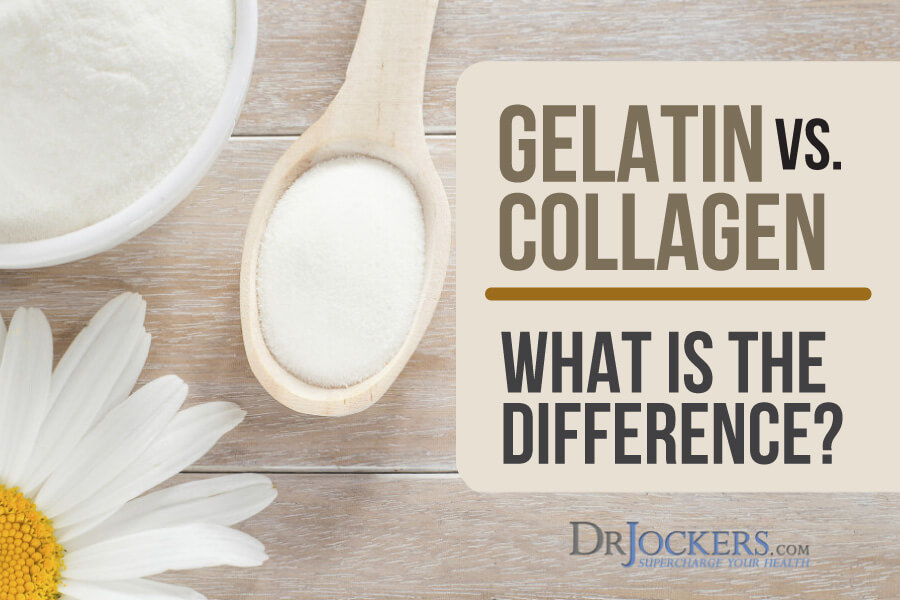 Gelatin vs Collagen: What Is the Difference?
Gelatin vs Collagen: What Is the Difference?
Gelatin and collagen are both nutritious substances that are praised for their wonderful benefits for joint, bone, skin, and gut health. Like many people, you may be unsure what the difference is between the two and if one is better than the other.
Collagen is the most abundant protein found in your body. It’s the primary substance of connective tissues that provides structural support holding your body together and is essential for the health of your skin, gut, joints, ligaments, bones hair, nails, teeth, heart, and liver.
However, as you age, your body’s natural collagen production slows down and requires outside help. Fortunately, through diet and lifestyle, you can improve your collagen levels and boost your health. This is where collagen peptides and gelatin come into the picture.
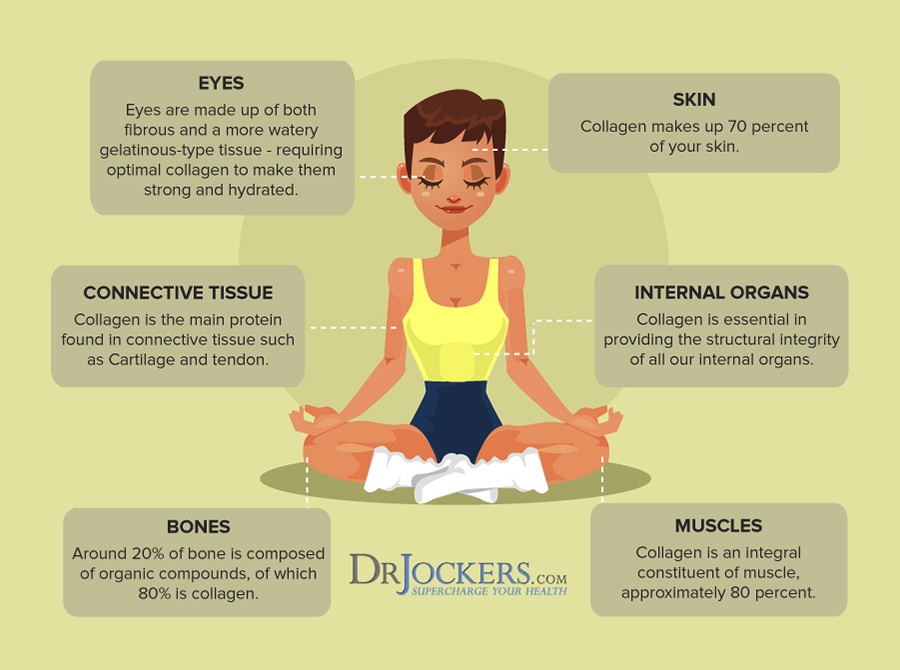
Collagen and Gelatin
Collagen peptides and gelatin are both important proteins rich in amino acids derived from the collagen protein molecule found in animal connective tissues. While both are beneficial for your health, they require a different method of preparation, have a different texture, and have different culinary and nutritional applications.
In this article, you will learn what collagen and gelatin are, their benefits, and the difference between the two. You will learn some natural ways to boost collagen production, my favorite collagen-filled and gelatin-rich recipes, and the collagen-boosting supplements I recommend.
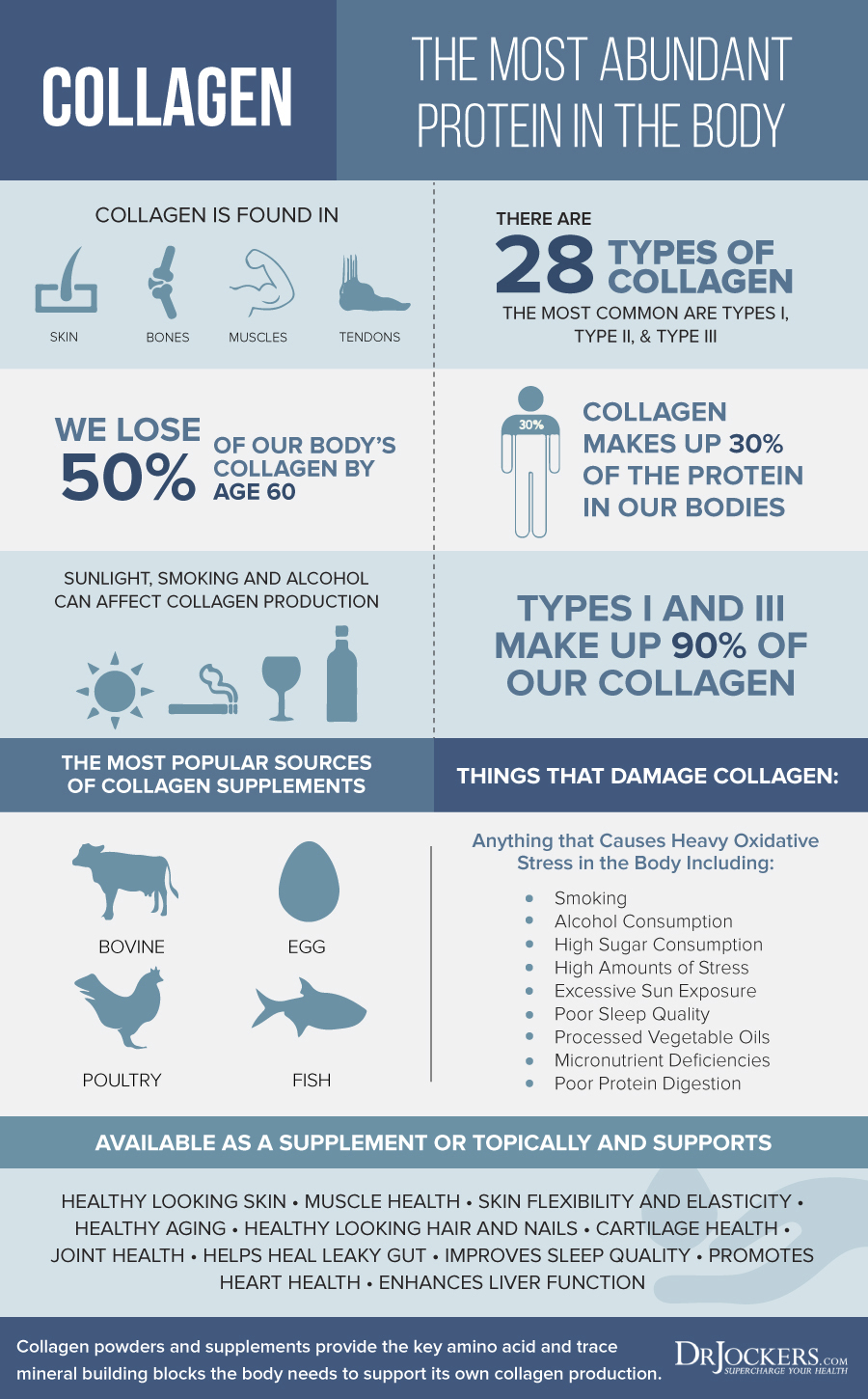
What Is Collagen?
Collagen is a structural protein that is also the most abundant protein in most animals. Collagen is the main component of connective fibers in tissues, such as your skin, cartilage, ligaments, bones, and teeth. It makes up about a quarter of your entire body’s protein content and about 70 percent protein content of your skin (1).
It is a structural protein that is found in your skin, hair, blood vessels, cartilage, ligaments, bones, intervertebral discs, teeth, and digestive tract. It gives bulk, shape, and support to your blood vessels, bones, and organs, such as your liver, kidneys, and heart.
Collagen practically serves as an intracellular ‘glue’ that holds your body together. It provides cushioning for your joints and tendons to stay healthy and active. It allows your body to move better, stretch, and bend. It supports your skin’s elasticity, strength, and integrity, hence the lack of collagen is responsible for visible signs of aging, such as wrinkles.
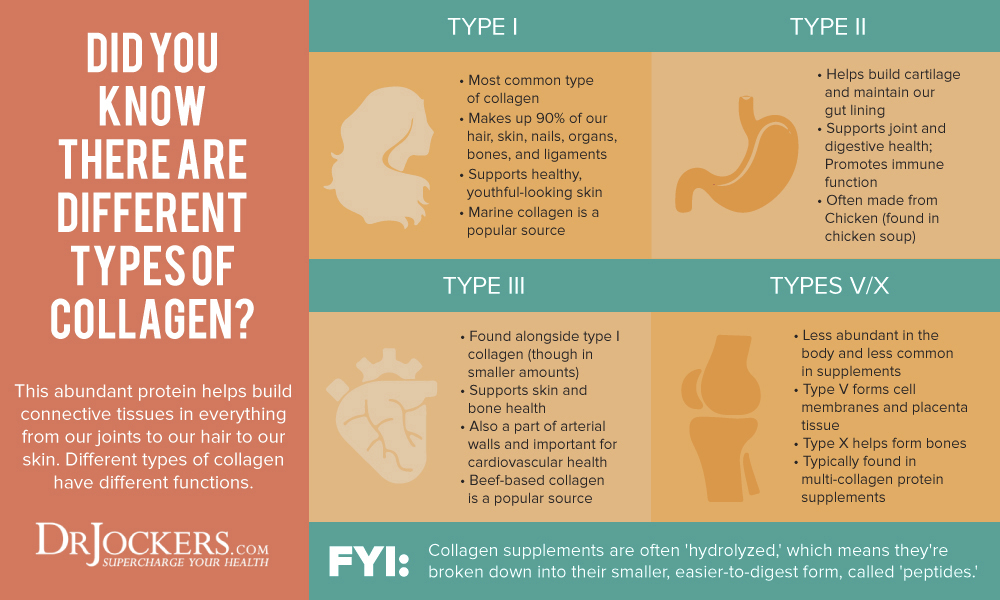
What Is Collagen Made Of?
Collagen is a complex protein that is made up of 18 different amino acids that serve as building blocks for your body.
The most abundant amino acids in collagen include:
- Proline: Proline makes up about 15 percent of collagen. It protects your blood vessels, supports cardiovascular health, and provides joint cushioning.
- Glutamine: Glutamine helps to reduce anxiety, brain fog, insomnia, low energy, compromised immunity, and weakened digestive function.
- Glycine: Glycine takes up about a third of all collagen. It helps the production of DNA strands, creatine formation, muscle growth, and energy regeneration.
- Arginine: Arginine helps to create nitric oxide in your body, which is important for your immune system and cardiovascular function.
Other amino acids found in collagen include Alanine, Hydroxyproline, Glutamic acid, Aspartic acid, Serine, Lysine, Leucine, Valine, Threonine, Phenylalanine, Isoleucine, Hydroxylysine, Methionine, Histidine, Tyrosine, Cysteine.
Symptoms of Poor Collagen Production
Collagen is incredibly important for your body’s healthy functioning and overall health. Poor collagen production may lead to a variety of health issues, including:
-
- Joint pain
- Skin blemishes
- Weakened nails
- Osteomalacia
- Increased frequency of injuries
- Osteoarthritis
- Repetitive injuries
- Tight Muscles and Joints
- Wrinkles
- Osteoporosis
- Hair thinning
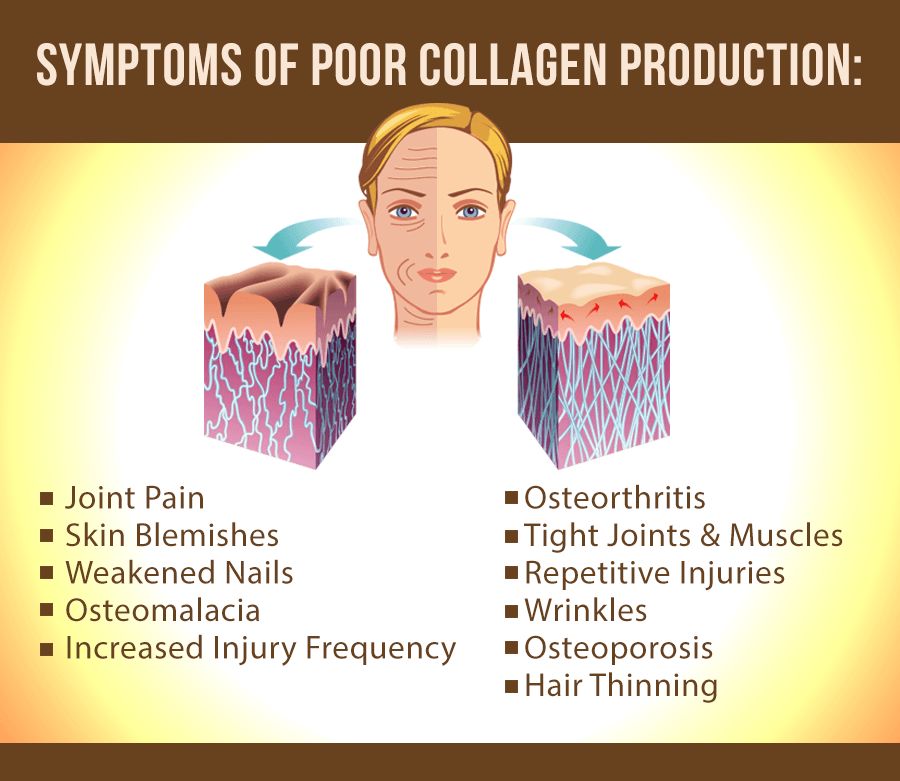
Benefits of Collagen
Collagen offers many benefits for your health, including a healthy metabolism, better digestion, healthier skin, and stronger hair. Let’s look at each benefit one by one.
Supports a Healthy Metabolism
Glycine, one of the amino acids in collagen helps to form muscle tissue by converting glucose into energy to feed your muscle cells. Two other amino acids in collagen, arginine, and glutamine help to boost your body’s ability to make protein and fuel your cells to maintain energy. As a result, collagen supports healthy metabolism and may help your weight loss efforts (2, 3).
Helps Repair and Heal Leaky Gut
Leaky gut, or intestinal hyperpermeability, is a condition in which tight junctions in your gut lining become too large and allow undigested food particles and toxins into your bloodstream leading to chronic inflammation, gut problems, and health issues. Glycine and glutamine in collagen help to repair damaged cells, rebuild new tissue, and improve gut health problems.
Strengthen Bones, Teeth, and Nails
About one-third of your bones are made up of collagen. Healthy collagen levels are essential for strong bones, strong jaw, healthy teeth, and healthy gum tissues. It also supports nail growth and healthy nails (4, 5).
Improves Skin and Hair Quality
The protein of your skin is about 70 percent collagen. Collagen is an essential building block of your skin. It’s important for skin elasticity and moisture. Collagen is essential for reducing wrinkles and maintaining a youthful skin tone. It is also important for healthy and strong hair, and for preventing hair loss (6).
Reduces Cellulite and Stretch Marks
Collagen is essential for your skin’s elasticity, thinnest, and appearance. Hence it may help reduce cellulite and stretch marks (7).
Protects the Heart
Collagen provides a structural framework for cardiac muscle cells. It provides the necessary stiffness to your heart wall, keeps your blood vessels strong, and helps repair tissue in the arteries (8, 9).
Supports the Liver and Detoxification
Your liver is the largest organ inside your body and is essential for detoxification. Glycine in collagen may help to reduce the damage to the liver from toxins, improve detoxification, and better your body’s use of antioxidants (10).
Repairs and Strengthens Joints, Tendons, and Ligaments
Collagen is a gel-like, smooth substance that covers and holds your joints together. It makes up the connective tissues such as tendons and ligaments that hold your muscles and bones together. It serves as a cushion and ‘shock absorber’. Optimal collagen levels help bone, joint, tendon, ligament, and muscle health, and may reduce the risk and symptoms of osteoarthritis, rheumatoid and other arthritis pain, and joint pain in athletes (11, 12).
Improves Sleep Quality
Glycine is collagen may be a therapeutic option for improving your sleep quality. It is important for regulating cortisol levels and promoting healthy relaxation during sleep (13).
You may learn more about collagen and its benefits by reading this article.
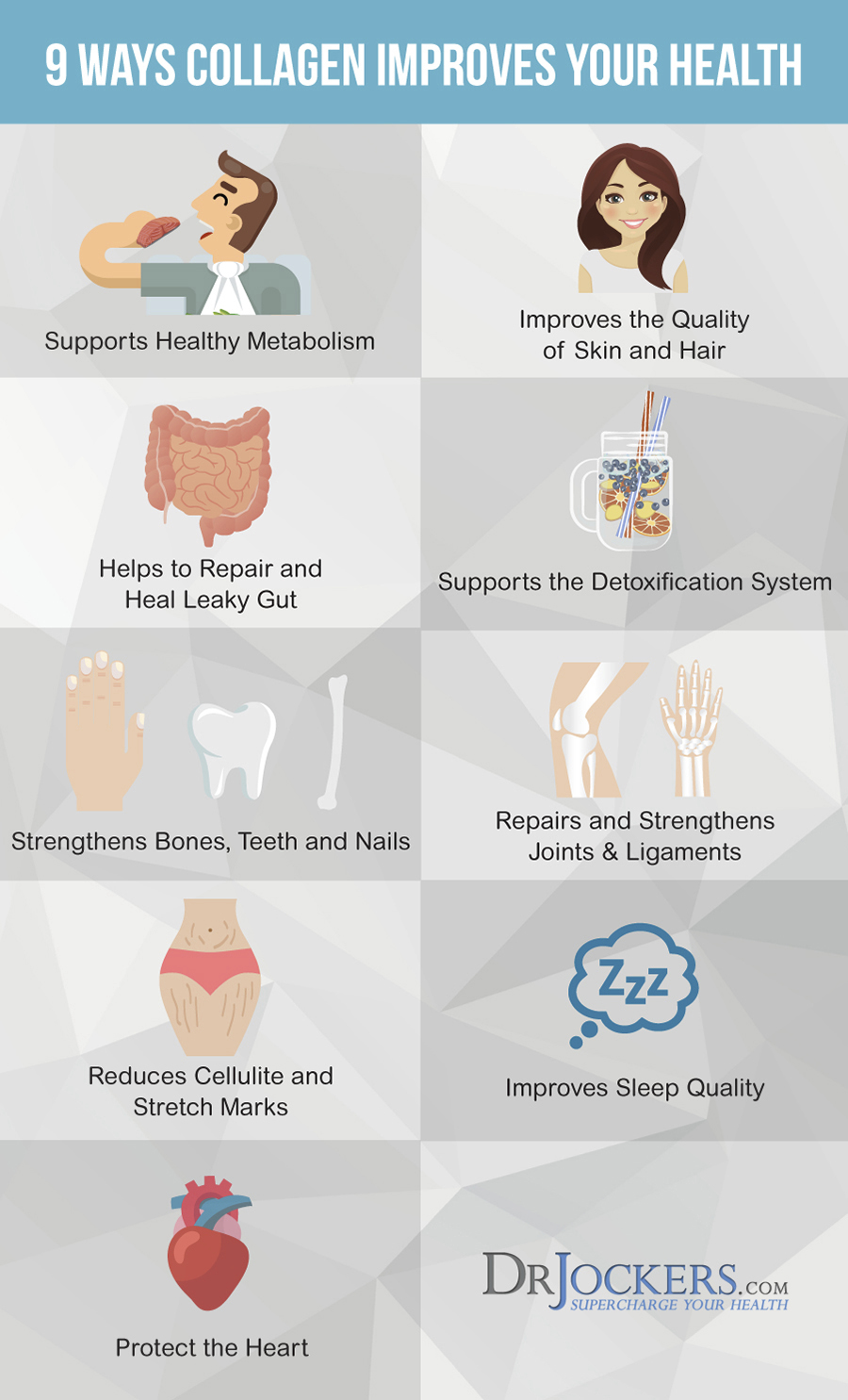
What Is Gelatin?
You might’ve heard that gelatin is great for your joints. It’s because when collagen breaks down, it turns into gelatin.
The truth is that though raw animal skin or hooves are good sources of collagen, they are not exactly human food. Unlike other animals, humans cook, boil, roast, or bake their food. Cooking turns collagen into gelatin.
Through this long and slow heating action, collagen proteins change through a process called denaturing. They become liquid, and once cooled, they become a wiggly and jiggly somewhat solid substance like Jell-O. This process not only gives soups and stews a nice flavor and texture, but also provides your body with amino acids that are needed for collagen production and improve your gut health, skin, hair, nails, and overall health as a result (14).
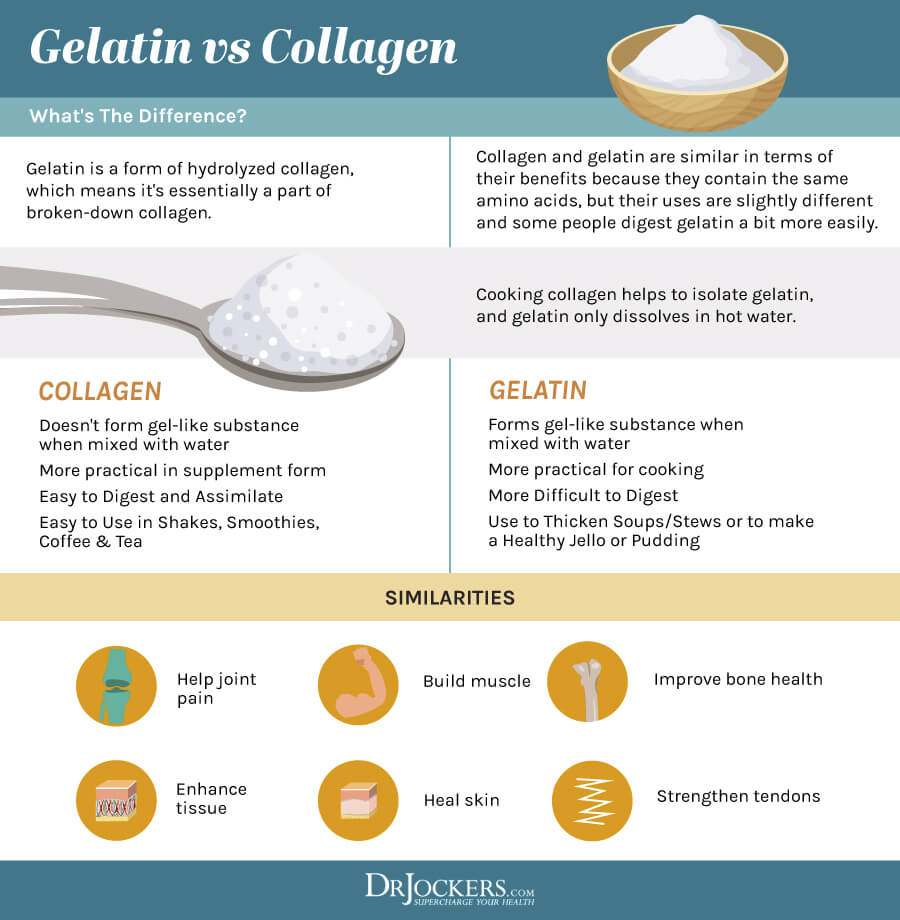
Benefits of Gelatin
Gelatin has a number of health benefits you should be aware of. Since gelatin contains the same amino acids as collagen does, they have similar health benefits.
Health benefits of gelatin include (15, 16):
-
-
- Improving skin health
- Strengthening bones and joints
- Improving hair quality
- Providing plenty of healthy protein
- Boosting digestive function
- Helping weight loss
- Improving sleep
-
Collagen vs Gelatin
Collagen peptides and gelatin both have their place in your diet depending on your needs. While gelatin is great, it may also be tricky to make. Gelatin needs hot water to dissolve completely. If the water is not hot, but lukewarm or cold, you end up with a clumpy substance forming a gelatinous blob.
Collagen peptides, on the other hand, are smaller collagen protein fractures. They are collagen particles that have been completely broken down. They dissolve easily and may be mixed with water, smoothies, shakes, coffee, and other recipes.
Collagen peptides possess all the important amino acids that gelatin does for proper collagen function and overall health. They may promote healthy, youthful skin, gut health, strong hair and skin, joint health, and overall health. They are also incredibly convenient and simple to use.
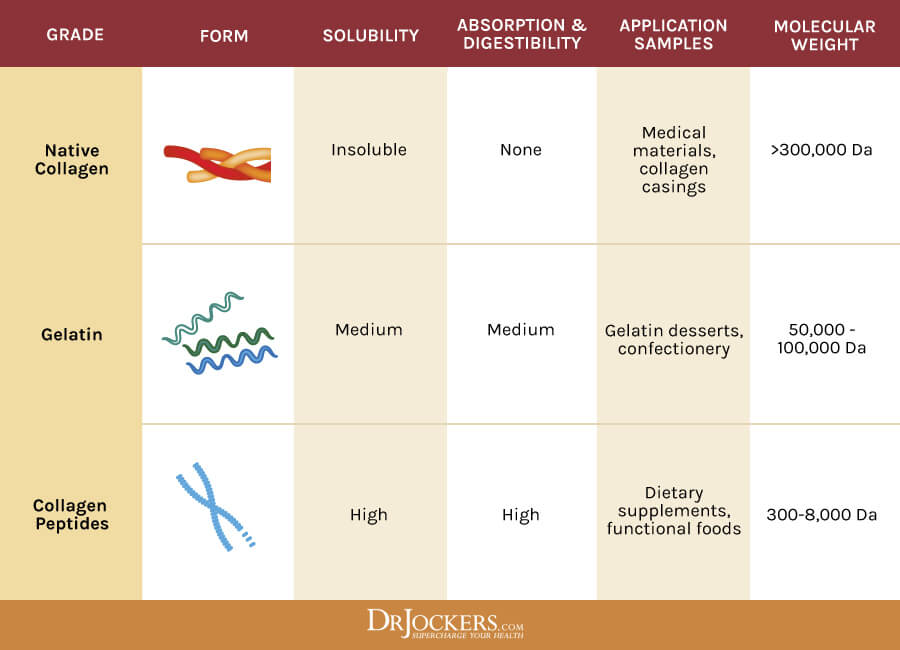
How to Boost Collagen Production
The truth is that collagen production naturally decreases as we age. However, it may also decrease or become depleted as a result of poor lifestyle choices, such as sleep deprivation, excess sugar, refined carbs, low vitamin C, high cortisol levels, smoking, and exposure to UV rays.
It is not enough to rely on your body to produce collagen to achieve optimal levels. You have to help it through good lifestyle choices, a nutrient-dense diet, and proper supplementation.
Some tips you may try to support your body’s healthy collagen production and your overall health include:
-
-
- Get your recommended daily serving of vitamin C through vitamin C-rich foods, such as citrus, kiwis, and kale, and supplementation.
- Eat foods that are rich in Proline such as asparagus, cabbage, free-range eggs, mushrooms, watercress, and tempeh.
- Eat foods rich in Glycine, such as bananas, cauliflower, kale, spinach, cucumber, and beans.
- Drink bone broth regularly. It is a highly nutritious drink with lots of collagen.
- Eat clean protein such as grass-fed beef, free-range poultry, and organ meats.
- Try my favorite healing recipes with collagen and gelatin.
- Try natural supplementation, such as Multi-Collagen Protein and Beef Gelatin by Microingredients
- Sleep plenty. Aim for 7 to 9 hours of restful sleep a night.
- Drink lots of water. Aim for 8 to 10 glasses a day, more if you are working, spending time outdoors on the hot sun, using the sauna, or recovering from an illness
-
Healing Recipes with Gelatin
Health doesn’t have to taste boring. In fact, nutritious recipes can taste amazing. There are so many nutrient-dense, guilt-free healing recipes out there that both adults and children will love. Just ask my sons, David and Joshua, who absolutely love their Gut Healing Gummy Bears and collagen-boosting Chocolate Cream Pie.
You can too enhance your body’s health by eating healing recipes with gelatin. Try some of my favorites we eat regularly with my family and I recommend to my patients all the time:
The Best Collagen and Gelatin
Making bone broths is one of the easiest ways to add nutritious collagen to your body. While you can certainly make your own bone broth from organic bones of animals, including pork, beef, veal, turkey, lamb, bison, chicken, or fish, for convenience, you may also try some bone broth powders. Bone broth powders are great because they are so versatile and you may use them in your shakes, smoothies, and other recipes.
You may find some high-quality bone broth products in my store. You may find bone broth collagen supplements in chocolate and vanilla flavors here. You may mix them with water or plant milk, or add them to your smoothies, shakes, or recipes.
One of my favorite collagen supplements includes Multi-Collagen protein and Beef Gelatin by Microingredients. They provide pasture-raised nutrition for bone and joint support, intestinal health, great sleep, and fitness. You may add it to your tea, coffee, shakes, soups, stews, desserts, and other recipes.
Final Thoughts on Gelatin and Collagen
Collagen is the primary substance of connective tissues and the most abundant protein in your body. It provides structural support and is necessary for the health of your skin, gut, joints, ligaments, bones, hair, nails, teeth, heart, and liver.
As you age, your body’s natural collagen production decreases. Fortunately, through a healthy diet and lifestyle, you can improve your collagen levels. Collagen peptides and gelatin may both help collagen levels in your body. Follow my recommendations in this article and try my gelatin-rich healing recipes for healthy collagen production, glowing skin, strong hair, good teeth, strong bones, healthy joints, optimal digestion, and overall health.
If you want to work with a functional health coach, I recommend this article with tips on how to find a great coach. On our website, we offer long-distance functional health coaching programs. For further support with your health goals, just reach out—our fantastic coaches are here to support your journey.
Inflammation Crushing Ebundle
The Inflammation Crushing Ebundle is designed to help you improve your brain, liver, immune system and discover the healing strategies, foods and recipes to burn fat, reduce inflammation and thrive in life!
As a doctor of natural medicine, I have spent the past 20 years studying the best healing strategies and worked with hundreds of coaching clients, helping them overcome chronic health conditions and optimize their overall health.
In our Inflammation Crushing Ebundle, I have put together my very best strategies to reduce inflammation and optimize your healing potential. Take a look at what you will get inside these valuable guides below!
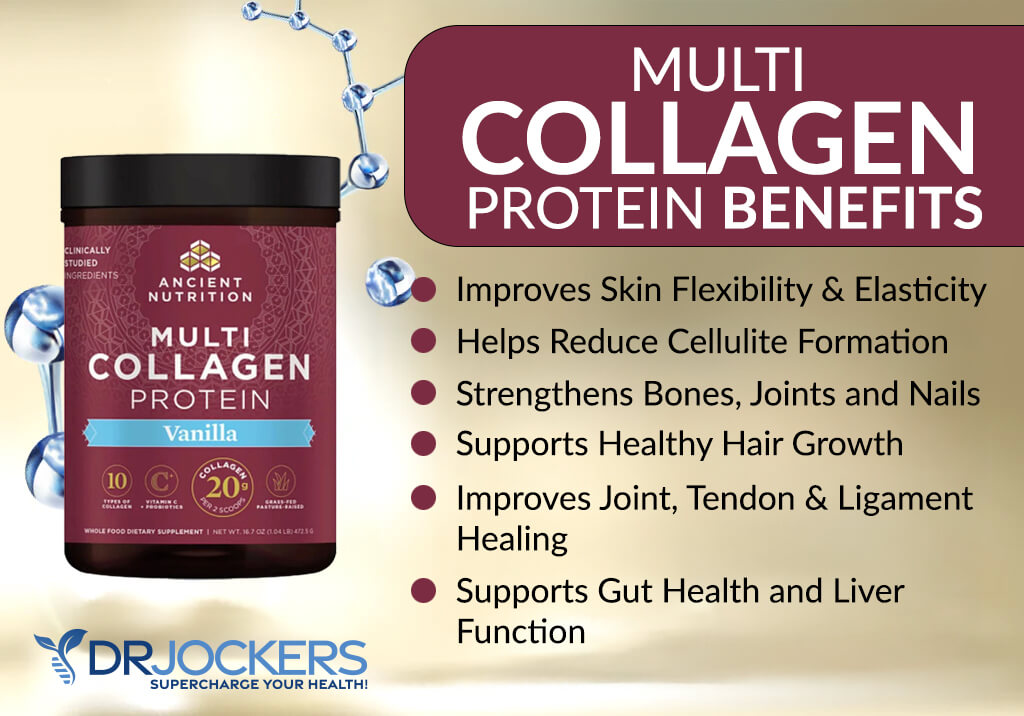
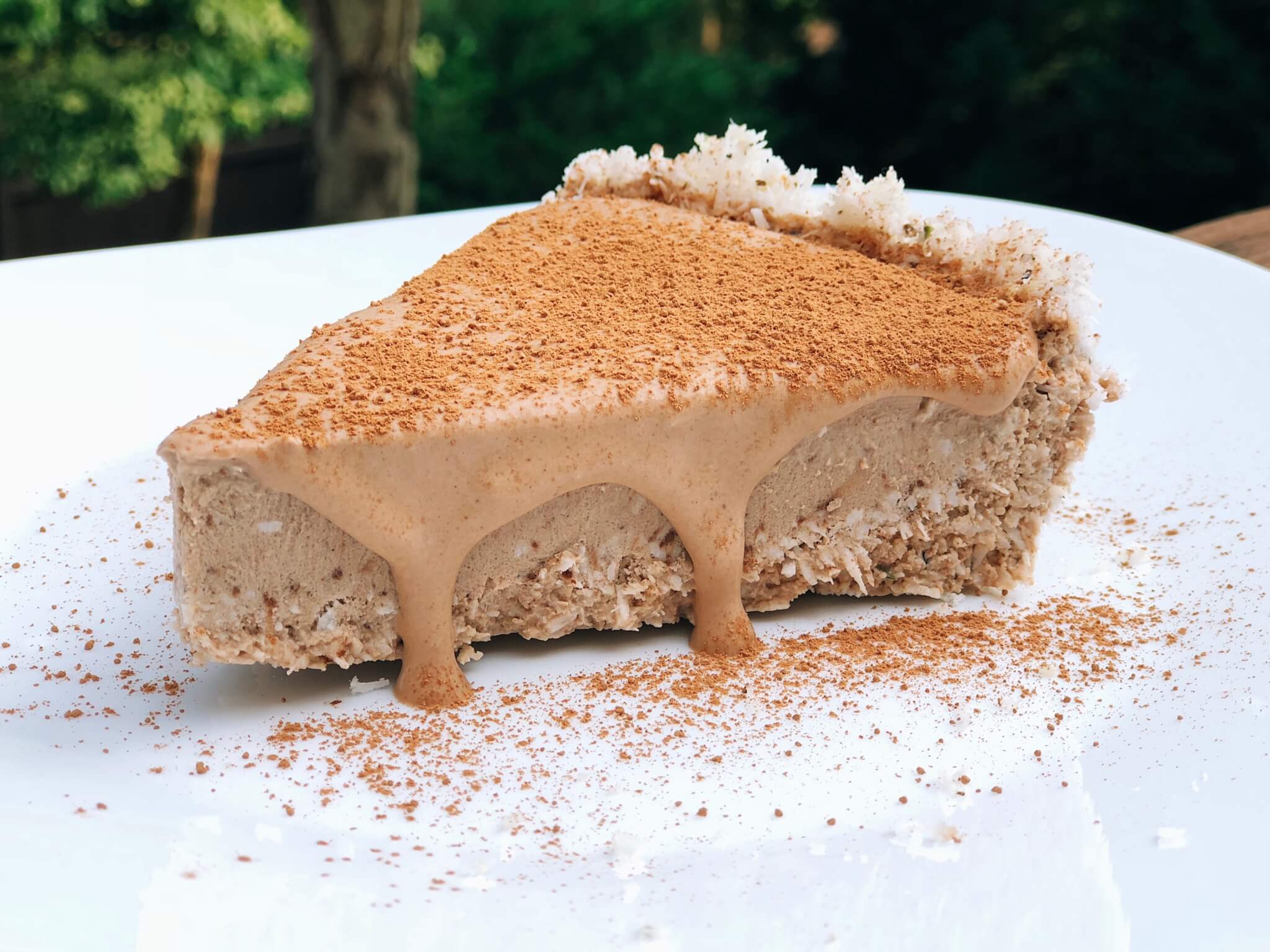






What does type 3 collagen support, please? I have EDS type3 and tke 2 collagen tablets day plus make my own bone broth. My hair is very fine and thinning. My nails badly ridged (osteo arthritis) but otherwise ok.
My big worry is how much more will i shrink? I’ve gone from 5’7″ to 5’2″ in 2 years. I have Scoliosis in the lumbar region, crypto spondlothesis and stenosis. I would love to know how I could stop this shrinking and the accompanying pain getting any worse.
Hey Marcia, I am sorry to hear that you are struggling with these health concerns. Type 3 collagen primarily supports skin elasticity and and organ health including blood vessel and tissue formation in the heart. This article offers more information on the many forms of collagen and the benefit of each to the body. I would recommend that you work with a functional health practitioner who will customize a specific plan for your health goals. This article can help.
Is collagen consumption safe for cancer patients ?
Hey Ablamba, Collagen is great for cancer patients as it will support the immune system and help the body heal. In general, we don’t want a very high protein diet with cancer patients, but the protein we want to limit is the protein that is rich in branched chain amino acids which would be meat and dairy. Collagen is low in BCAA’s and very supportive to liver detoxification since it is high in glycine so it is recommended for cancer patients.
Is there a problem with collagen with people with Herpes Simplex?
Hey Arthur, Collagen is just fine for individuals with Herpes Simplex and it is recommended as it will support the immune system and help the body deal with the virus.
I have recently read some info on collagen supplements and anxiety…apparently it can cause or exacerbate anxiety? Have you any info on this? Thx!
Hey Evelyn, The nutrients in collagen can actually alleviate symptoms of depression. In fact, imbalances in electrolytes that also can be a cause for depression are required to built healthy collagen in the body. Collagen has great healing abilities and can improve symptoms that cause stress on the body as discussed in this article.
I know that collagen, gelatin and bone broth would be very beneficial for me to eat but when I try to eat gelatin and bone broth I get very sick (massive headache, vertigo, overall malaise) since I am very intolerant of glutamate. Can you suggest anything that will allow me to eat these healthful foods? I used to be able to eat gelatin and bone broth, but now I am older, I am no longer able to.
Hey Nancy, Increasing vitamin B6 and magnesium as well as improving gut health can improve a glutamate sensitivity.
What other ways are there to boost collagen production for people who identify to 7/10 issues reported? What other recommendations and substitutions are there for people with allergies? eg. citrus, chocolate, vanilla, cinnamon, spices,
Hey Rose, yes we have a vegan product here that has no herbs or spices at all and naturally improves collagen production It contains choline stabilized orthsilicic acid https://store.drjockers.com/products/regenmax-liquid
I have found a number of statements that OPCs (Procyanidins) inhibits procollagen – see for instance https://link.springer.com/article/10.1007/s13770-017-0038-1
Since many natural antioxidants consist of procyanidins, is the procollagen inhibition a problem? I don’t know/understand enough to know so I hope that you may be able to shed some light on this. Thx.
Hello Frans, although collagen is a critically important protein structure in the body, it is possible to have too much collagen production. This creates scar tissue development, cardiac hypertrophy, arterial plaque and joint degeneration. The antioxidant compounds help to modulate and balance collagen production so that we get the optimal amount. Hope that helps!
Hello Dr. Thank you for your reply and explanation. However, I am now further confused that you seem to link “too much collagen” to “joint degeneration”. I though that joint degeneration happens first, which may then cause scar tissue to form. I also thought that collagen (and supplementation) should help for/prevent joint degeneration.
I am sure things are more complicated than my simplified view, but am I wrong in assuming that collagen supplementation will help for joint degeneration? Thx
Yes collagen products provide building blocks for healthy collagen formation. However, when chronic inflammation is impacting an area, scar tissue forms. Collagen supplements don’t aggravate the production of joint degeneration, they help to improve joint health. However, the biggest thing is getting the inflammation under control.